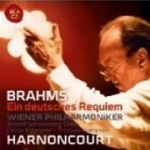Nikolaus Harnoncourt’s long period-performance experience impels him to deploy a Vienna Philharmonic that sounds little like the orchestra we expect in Brahms’ German Requiem–instead of the ensemble’s famed plushness we are treated to leaner forces with bare and sinewy textures. This creates a curious effect, making the music sound more baroque than Brahmsian. Also, through Harnoncourt’s uncanny ensemble balances, it exposes a wealth of inner detail.
In the opening “Selig sind” the unadorned cellos give the impression of human singing, although the smaller double-bass forces deny us the satisfyingly deep tonal foundation. Still, it’s these newly conceived timbres that keep the ear and mind ever attentive. And it works well on the first listen.
However, after the gloss has worn off, the interpretation’s fatal flaw emerges: Harnoncourt’s dispiritingly slow tempos. “Denn alles Fleisch” drags, exactly the opposite of what it should do given that lighter textures create a less massive impact at the movement’s climaxes. The faster second-half sounds quite tedious at Harnoncourt’s pace, as does the big fugue at the end of “Herr, lehre doch mich”. However, Thomas Hampson, through his soft-focused singing (whether by choice or due to vocal limitation) brings a plangent humanity to the normally stentorian baritone solo. Genia Kühmeier’s coolly beautiful tone illuminates “Ihr habt nun Traurigkeit”, though this movement drags as well.
Regardless of the degree to which Harnoncourt has altered its sound, the Vienna Philharmonic, whose players know this work intimately, plays handsomely for him, and RCA’s live recording captures the performance with both clarity and impressive power. This is decidedly not a Brahms Requiem for general consumption (that would be the classic Klemperer, Karajan’s EMI version, Blomstedt and San Francisco on Decca, or Colin Davis for RCA); but both connoisseurs and the endlessly curious may find enough here to hold their interest.
































